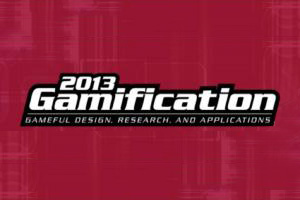Submissions sought for Gamification 2013 conference
June 10, 2013

The University of Ontario Institute of Technology's (UOIT) Faculty of Business and Information Technology (FBIT), and the University of Waterloo (Stratford Campus) are accepting submissions from presenters for Gamification 2013, an international conference on gamification (defined as when gaming elements such as small challenges or rewards are added to non-gaming tasks, in order to make them more fun, engaging and motivating, or to increase loyalty or advocacy).
Scheduled for October 2 to 4, Gamification 2013 will showcase current academic research in the field, opening the door for discussion around the growth of the gamification industry. The conference will cover a range of academic and industry research specifically aligned to expand the effective implementation of gamification in business, health, education and entertainment. University of Waterloo Stratford Campus will host the event in co-operation with the Special Interest Group on Computer-Human Interaction (SIGCHI) of the Association for Computing Machinery (ACM).
Those interested in presenting can submit their papers for participation. Topics may include:
- gamification metrics and processes
- gamification successes and failures
- methods of gamification commercialization
- research projects
- unanswered question about gamification
Presentations at Gamification 2013 consist of research paper and industry submissions. Submissions can be made at the Gamification 2013 submissions and review site.
Gamification 2013 is supported by academic and industry partners including, the University of Ontario Institute of Technology, the Association for Computing Machinery, the Games Institute, GAMER Lab, GRAND and IMMERSe.
Space is limited. For more details, please visit the Gamification 2013 website.
The gamification market is exploding; U.S. analyst Gartner Inc. estimates nearly three-quarters of large corporations will incorporate gamification by next year, while M2 Research predicts the market will reach C$2.8 billion by 2016.
Both UOIT and the University of Waterloo are at the forefront of gamification research. The Laboratory for Games and Media Entertainment Research (GAMER Lab) is UOIT's state-of-the-art graduate student and experimental research space for games, where a number of students are working in game design and gamification. The Stratford campus is home to Waterloo’s gamification hub, designed to bring together researchers and industry partners to explore how to use game thinking to get results.
Dr. Lennart Nacke, Assistant Professor, FBIT, and Research Director of the UOIT GAMER Lab, says events like Gamification 2013 are just what the field needs right now.
“In the past, researchers have fought much over how to define applied game design in systems and services that are not primarily about gaming per se, but would benefit from more fun, engagement and motivation of its users,” said Dr. Nacke. “Since gamification has become a huge industry trend, we have seen many business conferences about gamification, but we have a unique opportunity here with Gamification 2013 to combine academic knowledge with industry applications and explore gamification research in full. We are proud that our research group here at UOIT is a major part of this conference and this exciting new field."
“We’ve barely scratched the surface of gamification research, so to offer an academic approach, partnered with industry, is unique and really allows us to look at where this new business sector can go,” said Neil Randall, Director of the Games Institute at the University of Waterloo. “Gamification 2013 will provide an opportunity to showcase the depth of research underway at Waterloo, which will become the foundation for the future of gamification.”



